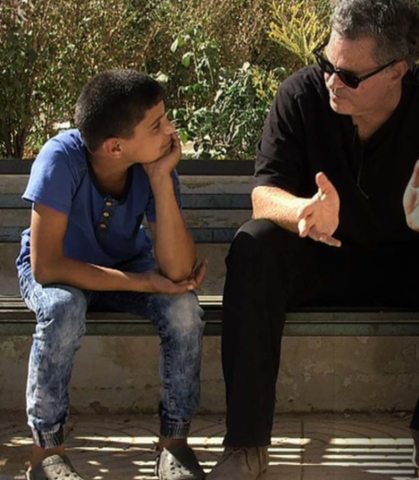
by Amy Stone
Where Are the Women Directors? Very Few at the NY Jewish Film Festival
Fresh from the #MeToo / Time’s Up show of unity at Sunday night’s Golden Globe awards, how could we not do a count of the number of women directors at this year’s New York Jewish Film Festival, opening today (January 10)? Natalie Portman’s words at the Golden Globes are still ringing in my ears. Co-presenter Ron Howard: “We are honored … to be here to present the award for the best director.” Portman: “And here are the all-male nominees.” (FYI, the only woman ever to win a Golden Globe award for Best Director was Barbra Streisand for “Yentl” in 1984.)
Certainly the NYJFF has a world of directors to choose from. A partnership of the Jewish Museum and the Film Society of Lincoln Center, the 27th annual New York Jewish Film Festival is truly an international event, bringing films and filmmakers from Israel, North America, South America, North Africa and Europe to the Walter Reade Theater and the Elinor Bunin Monroe Film Center.
My unaudited tally of the two-week festival’s main slate films:
Fourteen male directors
One female director, Su Goldfish, whose “The Last Goldfish” (screening at the festival January 10 and 15) is an autobiographical hunt into the past.
One joint male-female documentary, “The Prince and the Dybbuk,” directed by Piotr Rosolowski and Elwira Niewiera (screening January 10 and 11).
The rest of the film world is just as much a male preserve as Hollywood.
Women do better with the NYJFF shorts:
Five male directors
Six female directors (actually seven if you count the two women directors of “El Hara,” a portrait of the old Jewish ghetto in Tunis—on the shorts program January 21).
Two joint male-female directorships
Director tallies notwithstanding, the selection committee (well represented by women) has come up with a truly varied two weeks of film. The festival opens with “Razzia,” the US premiere by top Moroccan filmmaker Nabil Ayouch, chronicling five Moroccans pushed to the edge in Casablanca. It closes with the US premiere of Amos Gitai’s “West of the Jordan River” (opening commercially January 26), Gitai’s new documentary on Palestinians and Israelis dealing with the 50-year occupation.

Scene from “West of the Jordan River”
You could almost assemble a festival-within-the-festival of directors on family quests. In addition to Su Goldfish’s “The Last Goldfish,” there is also Daniel Najenson’s “The Impure.” Weaving in Najenson’s family history, the film investigates the history of the thousands of Jewish women from Eastern Europe and their pimps—sometimes their husbands—lured into Buenos Aires prostitution in the early 20th century. On the same bill (January 16), is director Daniella Koffler’s personal story, “Compartments.” The animated short, co-directed with Uli Seis, is the story of a young Israeli woman who wants to immigrate to Berlin, to the horror of her father, a Holocaust survivor.
Far from your typical Jewish family search, Peter Stephan Jungk’s “Tracking Edith” (January 22) documents the journey he undertook to understand his great aunt Edith Tutor-Hart. She was an Austro-British photographer and KGB spy who recruited the Cambridge Five, the Soviet Union’s preeminent British spy ring operating during World War II and beyond.
In the hail-and-farewell department, we mourn the demise this month of the Lincoln Plaza Cinema, just a few blocks south of Lincoln Center. We will miss this long-time champion of foreign films, including the regular screening of films with Jewish content. But, hopefully, we’ll always have the NY Jewish Film Festival, hopefully with a growing number of women filmmakers.
For film festival schedule and tickets: nyjff.org.
The views and opinions expressed in this article are the author’s own and do not necessarily reflect those of Lilith Magazine.